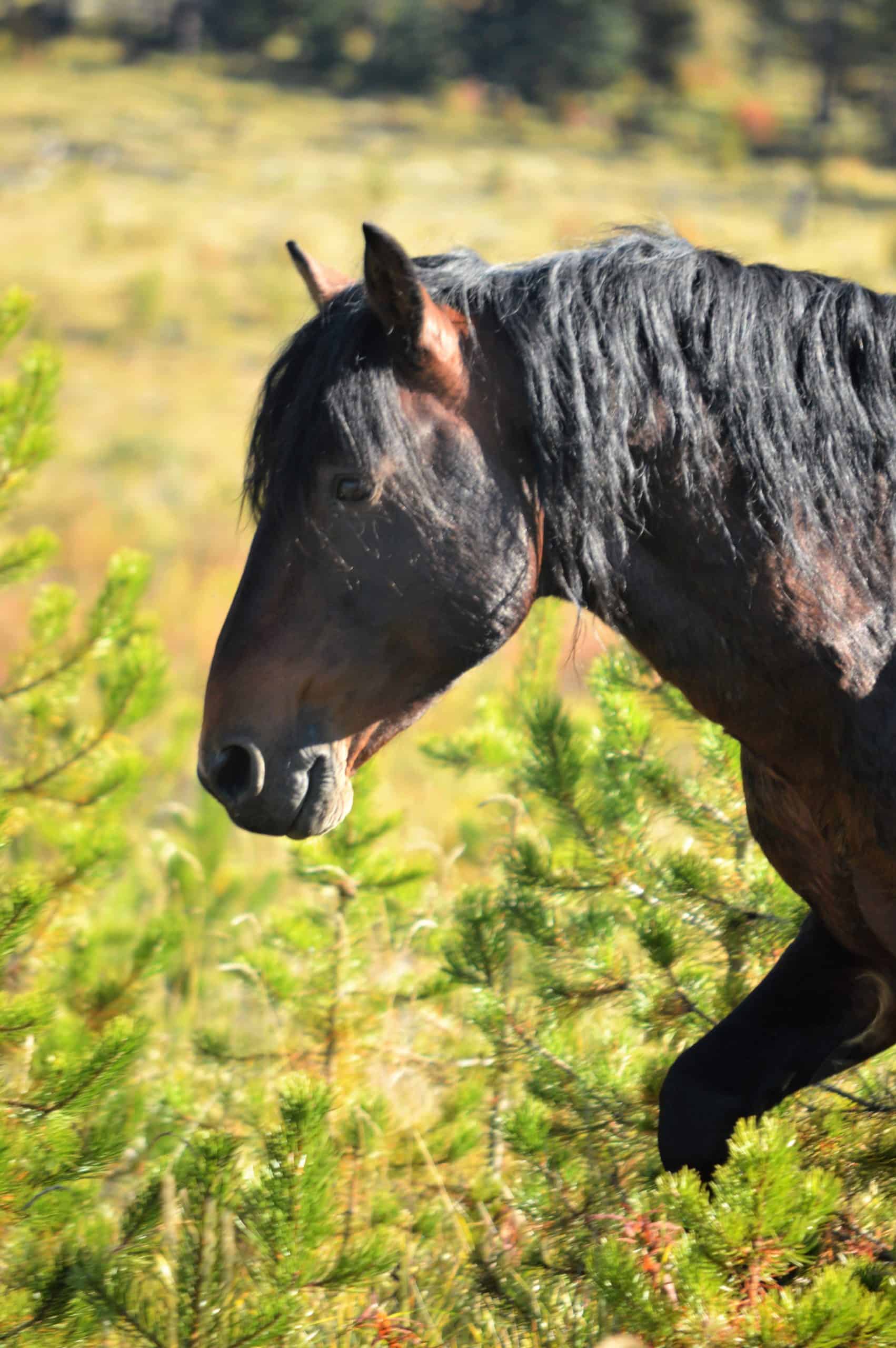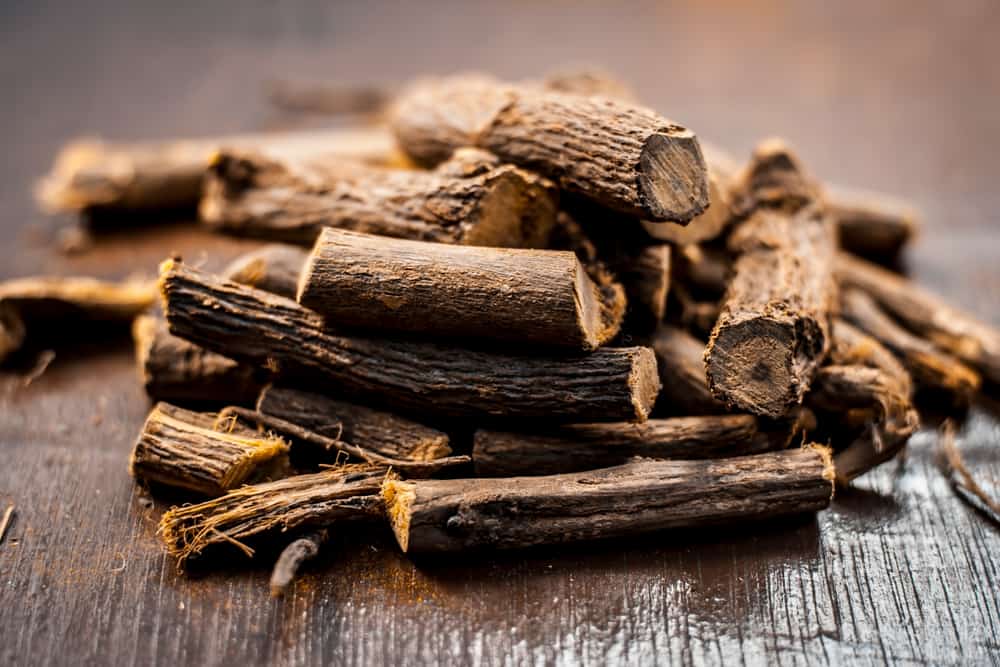What is licorice root?
Licorice root comes from the root of the plant, Glycyrrhiza glabra, and is widely used for both culinary and medicinal purposes. It’s notable sweetness make it popular as a flavoring agent. But it’s amazing therapeutic properties are where it really shines. The medicinal properties of its constituents, including glycyrrhizin acid (GA), glycyrrhetinic (GL), and glabridin (GLD) have been well documented over the years for a variety of different health conditions. And in this blog we are going to explore how licorice root can be a beneficial herb for your horse.
The benefits of licorice root for horses
The most beneficial properties of licorice for horses lie in its ability to promote healthy adrenal gland function, ulcer repair, and to build immunity against foreign pathogens such as bacteria, fungus, and viruses.
Let’s take a look at each of these properties to learn how licorice can benefit your horse
- Licorice root can help support your horse’s adrenal glands
As herd animals, horses are extremely prone to stress-related health problems. They are stressed when they run out of food. They are stressed when they are separated from their friends. They are stressed when they don’t have the freedom to move. They are stressed when they are over-trained. They are stressed when they don’t feel well. And sometimes they are stressed when you don’t feel well.
In response to these stressors, the adrenal glands release short bursts of specific hormones. These powerful chemicals including adrenaline and cortisol, prepare the body for fight or flight. However, when horses are stressed for a long period of time, the increased demands for cortisol and adrenaline start to tax the adrenal glands. When this happens they are unable to produce enough of these hormones to sustain basic body functions including immunity and inflammation.
Depleted cortisol levels are especially common for horses that have Insulin Resistance or Cushing’s Syndrome.
 Here’s why,
Here’s why,
- Irregular blood sugar levels in an insulin resistant horse will increase cortisol production.
- High ACTH levels, as is the case with Cushing’s horses, triggers the release of excess cortisol as well.
Why are burned-out adrenal glands a problem for your horse?
Cortisol is a natural occurring anti-inflammatory so when levels are depleted, the tissues, including the lamina, are much more susceptible to inflammation. This can cause body soreness as well as joint and hoof pain.
Low cortisol levels also hinder the horse’s ability to manage stress levels effectively. These horses are often sore, tired, and depressed.
How does licorice root support your horse’s adrenals?
Licorice root contains an acidic compound called glycyrrhizic acid. This substance stops the breakdown of cortisol in the liver and kidneys before it is inactivated for excretion. This allows for more cortisol to be available for the body.
This helps your horse:
- Manage their stress levels better
- Reduce inflammation in the tissues
- Balance important hormones in the endocrine system.
2. Licorice root is beneficial for horses with ulcers
Another benefit of licorice root is its ability to repair ulcers. Over 70% of domestic horses are suffering with gastric and/or hindgut ulcers. The most common causes of ulcers are stress infrequent feedings, high sugar or grain diets, commercial feeds, and the use of anti-inflammatories. Licorice root helps to heal ulcers by supporting healthy adrenal function, discouraging ulcer-causing bacteria, and producing mucus that helps protect and repair the intestinal lining.
In addition to supporting the adrenals and healing ulcers, let’s look at another important benefit of licorice root for horses.
3. Licorice root can strengthen your horse’s immune system to fight pathogens
Licorice root is well-known for its anti-viral, anti-bacterial and anti-fungal properties. Even though the mechanism is unclear, it is thought that the compound glycyrrhizin stimulates the production of interferon, a protein produced by the liver that triggers their anti-viral defenses.
Licorice can be particularly effective for viruses that affect the respiratory tract because of its ability to reduce inflammation in the airways and soothe the nasal passages.
In addition, this potent herb has also been shown to inhibit certain bacterial strains such as Helicobacter pylori, the bacteria that causes ulcers, as well as strains of Streptococcus and Enterococcus.
Licorice root’s effect on pathogens is especially beneficial for horses with a toxic leaky gut. Leaky gut is caused by high sugar/grain diets, excessive chemical dewormers, antibiotics, steroids, or a depletion of probiotics. The health of the microbiome in a horse’s hindgut is critical to their intestinal immune system and overall health.
What horses will benefit from licorice root?
As you can see from the many medicinal properties discussed here, licorice root can offer many benefits to horses. It can be considered for all horses who have experienced any one or combination of the conditions below:
- High stress

- Adrenal burn-out
- Gastric and/or hindgut ulcers
- Episodes of inflammation
- Immune-related health conditions
- Depression
- Weight gain
- Fatigue
- Frequent infections
- High blood sugar
How do you supplement your horse with licorice root?
Licorice root comes in powder form which can be added to their feed. Supplement with 2 – 3 teaspoons daily.
Interested in learning more?
My online training, Healing Horses Their Way, goes in-depth into using herbs to help horses and so much more. Get on the wait list here…
Meet Elisha
 I am an animal lover, health consultant, scientist and educator. I am passionate about delivering safe and effective health care to all animals but horses and dogs have a special place in my heart. I believe that through education and awareness of natural animal health we can drastically improve their quality of life and longevity. I invite you to join me on my quest to make the world a better place for all of them.
I am an animal lover, health consultant, scientist and educator. I am passionate about delivering safe and effective health care to all animals but horses and dogs have a special place in my heart. I believe that through education and awareness of natural animal health we can drastically improve their quality of life and longevity. I invite you to join me on my quest to make the world a better place for all of them.

Thanks so much for the info. going to start giving this to my pony
Hello Elisha
So can I purchase this licorice root at Irvins or do I need to get it from you??
Chat soon Ellen
Excellent article!
Thank you !
Thanks – great read and clear! Ps glad I also chose Li price tea lately
Great! Let me know how he does 🙂
Hi Ellen,
The licorice root is in the Riva’s Hormone Boost which Irvine’s carries
https://rivasremedies.com/shop/animals/horses/symptom/equine-metabolic-syndrome/hormone-boost/
You might also find the powder in the health food store in bulk.